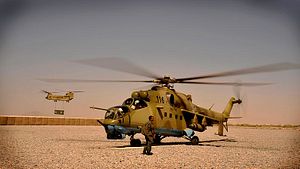Russia has decided to lift a long-standing, self-imposed arms embargo against Pakistan, according to state media.
On Monday the Moscow Times reported that Sergei Chemezov, head of state-owned technology corporation Rostec, said that Russia had decided to lift an arms embargo against Pakistan. Chemezov added that Russia is negotiating the sale of Mi-35 attack helicopters to Pakistan.
“The decision was taken and we are negotiating the delivery of helicopters,” he said, Voice of Russia reported.
Pavel Felgenhauer, whom AFP said is a leading Russian defense commentator, characterized the move as a “sea change” in Russian policy, and one that risked antagonizing India.
“This is an important, key change in Russian policy in the region,” Felgenhauer told AFP. He added: “The sale of arms to Pakistan will abruptly worsen our relations with India, the main buyer of our arms… This risks dismantling our cooperation with India.”
However, Boris Volkhonsky, head of the Asian sector of the Russian Institute for Strategic Studies, dismissed such views in comments to Russian state media on Monday. “I do not think that India will have any objections. After all, India and Pakistan both buy weapons from the U.S., and this has not bothered them,” Volkhonsky told Russian media
For its part, Pakistan is denying that an arms embargo ever existed at all.
India, the world’s largest arms importer in recent years, has long been the top purchaser of Russian weaponry. The AFP report suggested that Russia’s decision to lift the arms embargo against Pakistan may have been motivated by India increasingly purchasing arms from Western nations like the U.S., France and Israel. There have been other signs of strain in the Indo-Russian defense relationship in recent years.
The move could also be seen as being consistent with the general strengthening of ties between Russia and China in recent years. China and Pakistan have long cooperated together against India and selling arms to Pakistan could be Moscow’s attempt to create greater balance in its policy toward that triangular rivalry. In fact, over the last couple of years there have been numerous signs that Russia has been trying to increase ties with Pakistan. At the same time, Pakistan is by far the largest importer of Chinese arms. Indeed, by some estimates, 54 percent of Pakistan’s arms imports between 2009 and 2013 came from China. In that sense, Russian arms could theoretically now compete with Chinese defense companies in Islamabad.
Russia’s decision to remove its arms embargo against Pakistan, and enter into negotiations to sell Mi-35 attack helicopters, could also be part of the burgeoning rivalry between Russia and the United States. Washington has also historically been a large supplier of arms to Pakistan and the Mi-35s would most likely serve as a replacement for the U.S. made AH-1 Cobra attack helicopters that Islamabad has relied upon for years, primarily to aid in its counterinsurgency fight against militant Islamists located along its border with Afghanistan (the Afghan Air Force already uses Mi-35s).
Pakistan’s fleet of AH-1 Cobra attack helicopters has suffered from a plethora of problems and Islamabad has desperately needed to replace them for some time. One possible replacement that has been floated is the U.S. AH-1Z helicopters; however, the U.S. Marines are given priority over foreign customers for these helicopters. The fact that Russia is prioritizing the sale of the Mi-35s to Pakistan therefore signals that it might be prepared to offer Islamabad attractive financing options as a means of generating a greater foothold in the market.
The most logical reason for Russia’s decision to end its arms embargo, however, has to do with the coming NATO withdrawal from Afghanistan. Pakistan uses its current AH-1 Cobras primarily to aid in its fight against radical Islamic militants along its border with Afghanistan. Russia has an obvious interest in this fight given the threat it also faces from radical Islamists both at home and in former Soviet satellite states in Central Asia. In fact, Afghan’s Air Force consists mostly of M-17 and Mi-35 helicopters.
Upgrading Pakistan’s fleet of attack helicopters is probably Russia’s contribution to Islamabad’s efforts to contain radical Islamist militants in the region. This will be Russia’s selling point to India, which also has an interest in seeing Pakistan tackle its militancy problem. So long as the Russian-Pakistani defense relationship is limited to arms that primarily assist Pakistan’s counterinsurgency efforts, it is likely to be tolerated by India.

































